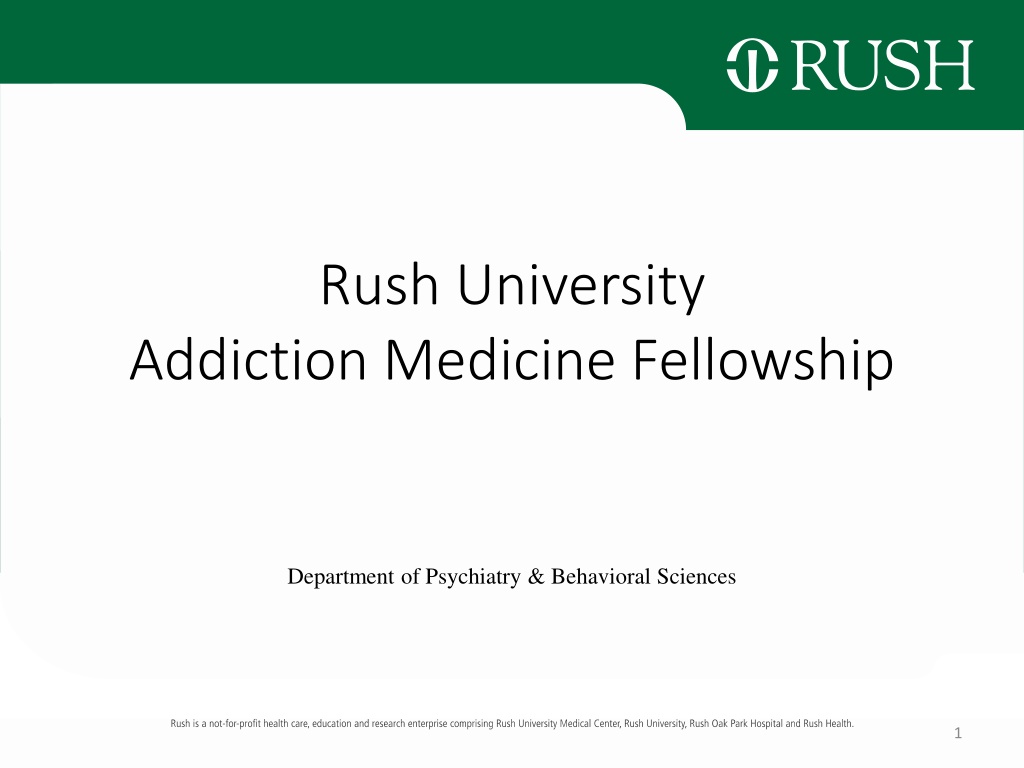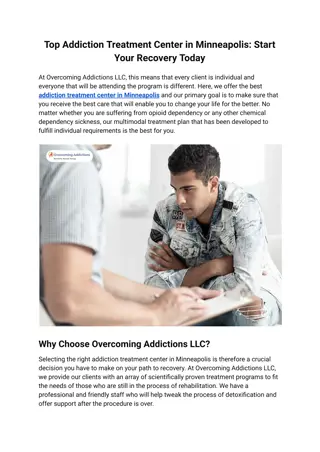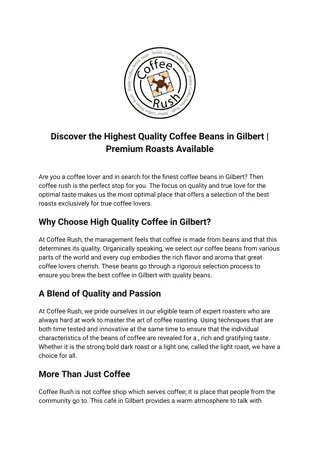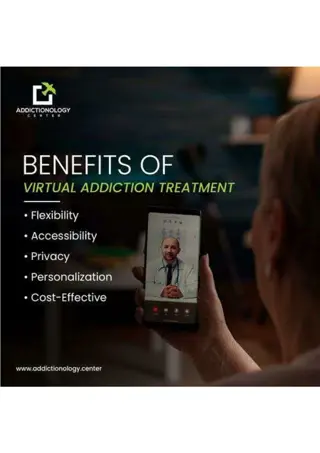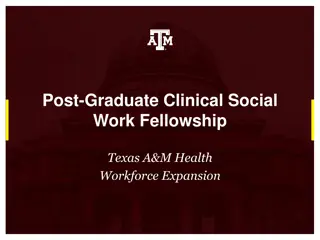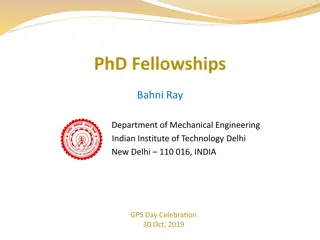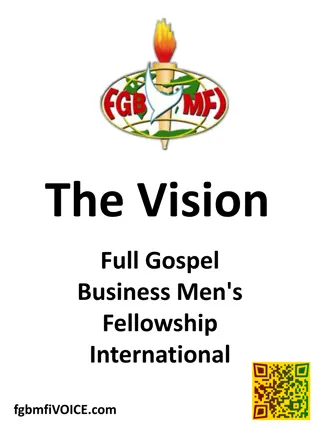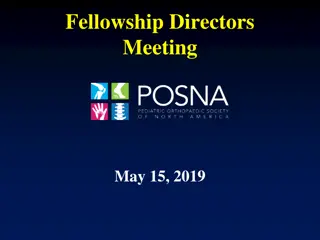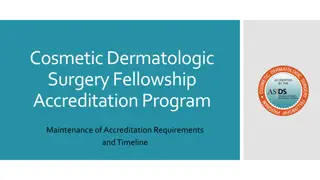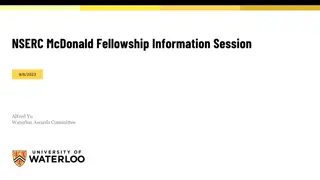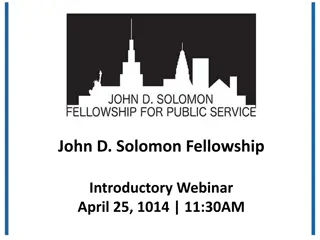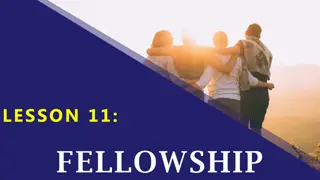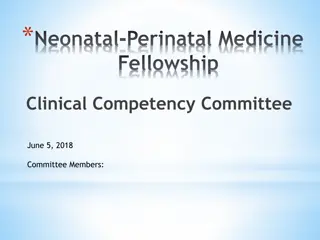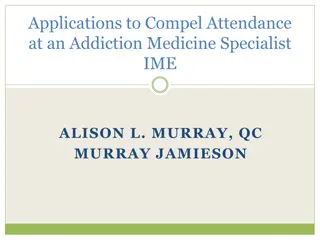Rush University Addiction Medicine Fellowship Overview
One-year ACGME-accredited multispecialty training program at Rush University focused on providing care for individuals with unhealthy substance use, substance use disorders, and other addictive disorders. The program utilizes a public health approach to comprehend the social and economic determinants of health for each patient. The mission is to offer a comprehensive and personalized model of addiction medicine through outstanding patient care, education, research, and community partnership. Goals include training future leaders, delivering compassionate and culturally sensitive care, and emphasizing evidence-based practices in addiction medicine. The program is led by Dr. Gail Basch (Program Director) and Dr. Ruchi Fitzgerald (Associate Program Director), with support from Senior Program Coordinator Vicki Nelson and a distinguished faculty.
Download Presentation

Please find below an Image/Link to download the presentation.
The content on the website is provided AS IS for your information and personal use only. It may not be sold, licensed, or shared on other websites without obtaining consent from the author. Download presentation by click this link. If you encounter any issues during the download, it is possible that the publisher has removed the file from their server.
E N D
Presentation Transcript
Rush University Addiction Medicine Fellowship Department of Psychiatry & Behavioral Sciences 1
Overview Overview One - year ACGME-accredited multispecialty training program Focuses on the provision of care for persons with unhealthy substance use, substance use disorders and other addictive disorders. Utilizes a public health approach to address the ramifications of substance use disorders and comprehend the social and economic determinants of health with respect to the individual patient. 2
Mission Statement Mission Statement To provide a comprehensive and personalized model of addiction medicine that optimizes and provides the best health care for the individuals and diverse communities we serve through the integration of outstanding patient care, education, research, and community partnership. 3
Goals for the Addiction Medicine Fellowship Goals for the Addiction Medicine Fellowship Train the next generation of leaders in addiction medicine. Offer patient care that is compassionate, culturally-sensitive, and that addresses health care disparities in the urban underserved population in the Chicago area. Apply evidence-based practices in the biomedical, clinical, epidemiological sciences and social-behavioral sciences to their care of patients. Encourage fellows to pursue a career focused on clinical care, research or teaching, health care leadership, and as a scholarly addiction medicine physician. 4
Leadership Leadership Dr. Gail Basch, Program Director Dr. Ruchi Fitzgerald, Associate Program Director
Senior Program Coordinator Senior Program Coordinator Vicki Nelson 6
Faculty Faculty Dr. Gail Basch Dr. Ruchi Fitzgerald Dr. Henry Swoboda Dr. Jenna Nikolaides Elisabeth Ramsey, LCSW Dr. Neeral Sheth Dr. Kathleen McDonough Dr. Nancy Reau Vicki Shah, PA-C Emily McKernan, LCSW Dr. T. Celeste Napier Dr. Niranjan Karnik Meghan Baldwin, APRN Dr. Tran Tran Dr. Wesley Cook Dr. Hilton Gordon Dr. Sean O Mahony 7
Rush University Addiction Medicine Rush University Addiction Medicine Rush University s Department of Psychiatry and Behavioral Sciences has a demonstrated commitment to addiction medicine research, education and clinical care. Under the direction of Dr. Niranjan Karnik, Rush University received a SAMHSA SBIRT (Screening, Brief Intervention and Referral to Treatment) Grant, which led to universal screening for all Rush emergency room and medical/surgical inpatients for unhealthy substance use. The Substance Use Intervention Team (SUIT) was implemented in 2017, an interprofessional Addiction Medicine Consultation Service that has screened over 40,000 medical/surgical patients with stepped care intervention for those affected with substance use disorder(SUD). 8
Clinical Experience Clinical Experience Inpatient/Outpatient in an urban academic center (Rush) and a community setting. Community partnerships located in Chicago s West Side, an area profoundly affected by the racial, social and economic determinants of health. The overarching goal of the Rush Addiction Medicine Fellowship is to offer the Addiction Medicine Fellow with the experiences needed to develop into an addiction medicine physician who can compassionately care for patients within their biopsychosocial contexts, and work confidently and collaboratively in interprofessional teams in both the urban academic and the community setting. Schedule flexibility is based on prior clinical experience and future career interests. Fellows who are interested in public health, education and advocacy will be mentored in these areas. 9
Rotations Rotations Inpatient hospital-based addiction medicine experience with the Rush Addiction Medicine Consult Team (SUIT) to gain confidence in their addiction medicine skills, while building the fellow s outpatient panel in their SUIT Continuity Clinic and their Rush Addiction Medicine Program (RAMP) Outpatient Dual Diagnosis Clinic. Longitudinal experiences in Community Addiction Medicine at PCC Wellness/West Suburban Hospital and Thresholds Substance Use Treatment Center. Electives at an Opioid Treatment Program (Family Guidance) as well as a rotation with the Rush Hepatology Department (alcohol related liver disease and viral hepatitis treatment). Fellows have dedicated time for didactics, teaching, research and scholarship within their rotation schedule. 10
Inpatient : Inpatient : Substance Use Intervention Team (SUIT) Substance Use Intervention Team (SUIT) SUIT is a team-based inpatient consultation service. Fellows work collaboratively as consultants and as members of interdisciplinary teams, including as team leaders when appropriate with multiple learners on the service. Fellows have repeated opportunities for screening, brief intervention with medical treatments and motivational interviewing, and referral of patients to specialized clinics/treatment centers(SBIRT). Fellows follow their patients in their outpatient SUIT continuity clinic, offering opportunity to develop an appreciation for addiction as a chronic disease process. 11
Outpatient : Outpatient : Substance Use Intervention Team (SUIT) Substance Use Intervention Team (SUIT) The Substance Use Intervention Team (SUIT) facilitates the Addiction Medicine Outpatient SUIT Clinic- a longitudinal experience for the Addiction Medicine Fellow. Supervised by Dr. Henry Swoboda, Director of Medical Toxicology and SUIT Director. Fellows conduct comprehensive substance use assessments, prescribe buprenorphine and other medications for addiction treatment, enhance their motivational interviewing skills, and learn to understand the impact of the social determinants of health. Fellows manage SUD across the adult age spectrum see continuity patients, as well as same-day patients in this clinic model. Fellows have substantial opportunities to teach and supervise medical students and residents during this clinic. 12
Outpatient: Rush Addiction Medicine Program (RAMP) Outpatient: Rush Addiction Medicine Program (RAMP) Dual Diagnosis Clinic Dual Diagnosis Clinic Longitudinal setting to identify and treat common co-occurring psychiatric conditions. Supervised by Addiction Medicine Fellowship Director, Dr. Gail Basch. Fellows gain confidence in treating SMI (serious mental illness) along with SUDs in this continuity clinic while working collaboratively with the program director Fellows manage SUD across the adult age spectrums, SUD in the pregnant patient, and SUD in the medical professionals. Fellows work collaboratively with other Rush departments to care for RAMP patients and create comprehensive treatment plans in a shared decision-making process with the patient affected by SMI and SUD. 13 Telemedicine is incorporated into the RAMP experience.
Community Addiction Medicine at PCC Wellness Center Community Addiction Medicine at PCC Wellness Center The Community Addiction Medicine Rotation is a longitudinal experience for the Addiction Medicine Fellow. Fellows are supervised by the Associate Program Director, Dr. Ruchi Fitzgerald. Fellows learn to provide culturally-sensitive care to a vulnerable patient population that accesses PCC Wellness Center (Federally qualified health center) and West Suburban Hospital, located in the Austin neighborhood of Chicago. Fellows gain confidence in care for pregnant women and postpartum women with SUD, integration of treating opioid use disorder with treatment of Hepatitis C and have the opportunity to practice inpatient addiction medicine in a community hospital setting. 14
Outpatient Community Addiction Medicine Thresholds Outpatient Community Addiction Medicine Thresholds Thresholds is one of the oldest and largest providers of recovery services for persons with mental illnesses and substance use disorders in Illinois. Located in the Garfield Park neighborhood of Chicago, a neighborhood with disproportionately high rates of opioid overdoses, poverty and gun violence. Within a longitudinal experience, fellows care for patients affected primarily by opioid use disorders in collaboration with therapists and recovery coaches. Fellows gain confidence with caring for patients within criminal deflection programming. Fellows gain valuable insight into the social and economic determinants of health and the importance of the behavioral health team as well as the value of community organizations in Chicago. Fellows have numerous opportunities to engage in community overdose prevention/harm reduction efforts. 15
Opioid Treatment Program Elective Rotation at Family Guidance Centers, Opioid Treatment Program Elective Rotation at Family Guidance Centers, Inc. Inc. Fellows rotate with the clinical team at an opioid treatment program (OTP, methadone for the treatment of opioid use disorder, OUD) in underserved areas of Chicago. Fellows gain knowledge of the use of methadone for the treatment OUD by learning the systems of care in an OTP and how an underserved population accesses methadone. Fellows work closely with the lead physician and lead nurses/counselors in an interdisciplinary team during this rotation and have ample opportunities for bidirectional learning for the Family Guidance Team. 16
Rotation Rotation - - Palliative Medicine and Advanced Pain Management Palliative Medicine and Advanced Pain Management The Palliative Inpatient Consultation Service assists RMC patients in the evaluation and management of pain and symptom management when facing serious, life-limiting illnesses and provides clarification of goals of care, transitions care to comfort-focused therapies and provides intensive comfort care for patients being withdrawn from life-sustaining therapies. Fellows assess patients with chronic pain for substance use, addictive disorders, substance-related health problems and co-occurring psychiatric illness. Fellows may taper prescription opioids to safe doses, prescribe naloxone, initiate buprenorphine-naloxone, or refer to a community methadone/buprenorphine clinic, as appropriate. Upon completion of this elective, Fellows gain confidence in their skills in advanced pain management and in teaching the REMS Safe Opioid Prescribing Course offered through the American Society of Addiction Medicine, an opportunity available through the Illinois Society of Addiction Medicine for fellows interested in pursuing 17
Rotation Rotation- -Hepatology at Rush University Medical Center Hepatology at Rush University Medical Center Fellows rotate with the Rush University Medical Center Hepatology Team. This immersive experience integrates the fellow with an interdisciplinary team and Fellows enhance the knowledge of advanced liver disease as it relates to alcohol use disorder and viral hepatitis. Fellows participate in an extensive didactic (both self directed and with the Section Chief of Hepatology) on gaining confidence in the treatment of Hepatitis C, as many addiction medicine clinicians choose to address viral hepatitis in their future clinical practice. Includes participating with the liver transplantation care team and playing an active role for bolstering continuity of care for patients with advanced alcohol use disorders at RUMC. 18
Rush Opioid Use Disorder Treatment Fellowship ECHO Program for Rush Opioid Use Disorder Treatment Fellowship ECHO Program for Practicing Providers Practicing Providers Fellows have the unique opportunity to participate in the ECHO program to train primary care providers in the assessment and treatment of OUD. This program is directed by Dr. Nicole Gastala, and its primary goal is to increase access to OUD treatment services in areas of Illinois that have limited or no access to treatment. Fellows participate in an immersive weekend alongside other clinicians and have the chance to become familiar with the hub and spoke ECHO education dissemination model for OUD. 19
Research, Education and Scholarship Research, Education and Scholarship The leadership of the addiction medicine program is committed to advancing the research and scholarship interests of the addiction medicine fellow. Fellows are Encouraged to pursue scholarly activity in the area of addiction medicine. Participate in the Rush University Research and Compliance Online Courses prior to engaging in a research project, in order to gain confidence in writing a research proposal and submitting a project for IRB approval. Matched to mentors within RUMC (including meeting the physicians in the department of their primary board specialty) and the community based on their specific interests. Have numerous opportunities to formally teach other clinicians (through the Illinois Society of Addiction Medicine) and medical students and will gain confidence in teaching the buprenorphine waiver course, and the REMS safe opioid prescribing course. Should Fellows express interest in grant writing or other academic interests, they will be directed to the appropriate mentoring pathways available at Rush University. 20
Future of the fellowship Expansion: growing the workforce for addiction medicine and addiction psychiatry caring for the medically underserved In June 2020, HRSA awarded $20.3 million to 44 recipients to increase the number of fellows at accredited addiction medicine and addiction psychiatry fellowship programs. The awardees will train addiction specialists at facilities in high need communities that integrate behavioral and primary care services. July 2021: $15 million increase for the Mental and Substance Use Disorder Workforce Training Demonstration program (includes loan repayment). ($41.7 million total appropriated). Expected HRSA NOFO: Jan 2021 for AMF expansion. 21
Career Development Career Development The Addiction Medicine Fellowship and its leadership are committed to the career development of the Rush Addiction Medicine Fellow. Fellows will be encouraged to attend conferences, educational workshops and other scholarly pursuits in order to enhance their professional development. There are many pathways for a career in addiction medicine after the completion of an addiction medicine. The leadership of the Rush Addiction Medicine Fellowship is committed to the professional development and success of the fellows, and to an ongoing mentoring relationship within the addiction medicine community. 22
American Board of Preventive Medicine Board Exam Exam is offered annually in the fall (October). Program leadership supports fellows throughout the year with the study process: independent study, ADePT exam, and board review questions. Rush University offers LEAP funds for educational support activities (can be used for textbook purchase, attending conferences, board review). 23
Summary Summary The Rush Addiction Medicine Fellowship is designed to create a broad range of educational experiences that address health care disparities in the population served by Rush University and its community partners. Graduates will be supported in their career goals by the faculty of the Addiction Medicine Fellowship, who are a diversely trained clinical group from many different specialties (Psychiatry, Emergency Medicine/Toxicology, Family Medicine, Pharmacology, Psychiatry Nurse Practitioner, Licensed Clinical Social Worker). The Fellowship is a dynamic fellowship designed to adapt to changes in the health care system, the educational climate and meet the individual goals of the addiction medicine fellow. 24
